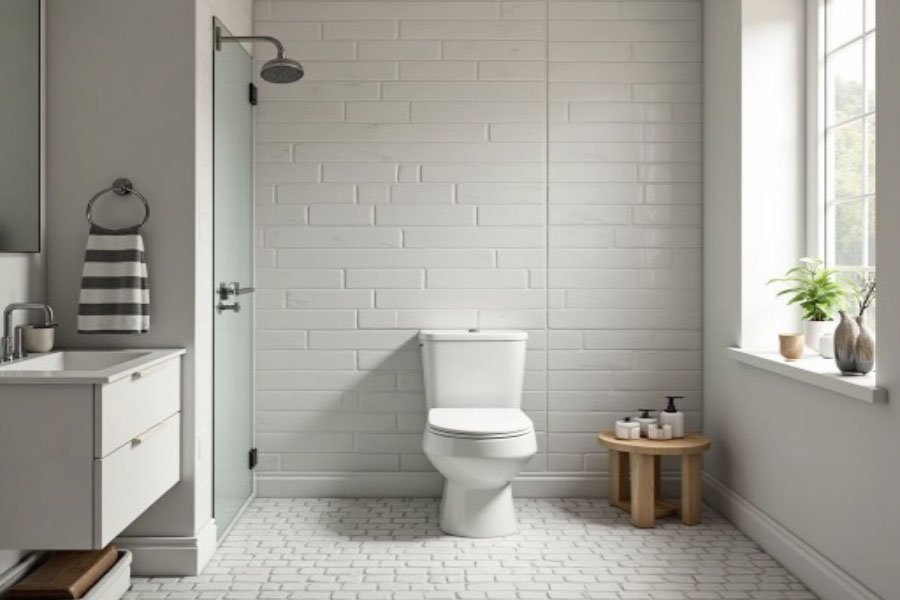Regrouting: A Guide for Homeowners
Grout plays a critical role in keeping your shower tiles secure and waterproof. Over time, however, grout can deteriorate, leading to water damage, mould growth, and an unsightly appearance. In Australia’s humid climate, maintaining your shower grout is even more important, as excess moisture can speed up wear and tear. But how do you know when it’s time to regrout your shower?
Here are 7 signs that your shower needs regrouting:
1. Cracks in the Grout
One of the most obvious signs that your shower needs regrouting is visible cracks in the grout. These cracks allow water to seep behind the tiles, potentially causing damage to your walls and subfloor. Even small cracks can lead to significant problems, especially in Australia’s humid areas. If you notice any cracks, it’s time to consider regrouting before things get worse.
2. Discoloured Grout
Grout discolouration can occur due to mould, mildew, or dirt build-up. While regular cleaning can sometimes restore its appearance, discolouration that doesn’t fade with cleaning might indicate that the grout is compromised. In Australia, where coastal regions experience higher humidity levels, discolouration is a common issue. Regrouting will not only refresh the look of your shower but also prevent further mould growth.
3. Loose or Missing Tiles
If you notice tiles becoming loose or falling off, it’s a red flag that the grout isn’t doing its job anymore. Loose tiles are often a result of grout erosion, which weakens the bond between the tile and the surface. In Australia, with fluctuating weather conditions, especially in coastal regions, this can accelerate. Regrouting will help secure your tiles back in place and prevent future damage.
4. Mould and Mildew Growth
Australia’s warm and often humid environment creates the perfect breeding ground for mould and mildew. If you notice mould consistently returning despite regular cleaning, the grout may no longer be sealing your tiles effectively, allowing moisture to penetrate. Regrouting will create a fresh, waterproof barrier that keeps mould at bay and protects your shower from potential health hazards.
5. Water Leaks
If you spot water pooling outside your shower or notice damp patches on the walls adjacent to your bathroom, it’s likely that the grout has deteriorated, allowing water to escape. This is particularly concerning in Australian homes, where water damage can lead to costly repairs if left unattended. Regrouting your shower will prevent leaks and save you from expensive fixes in the long run.
6. Uneven Grout Surface
Over time, grout can become uneven or eroded due to regular wear and exposure to water. If your grout lines feel rough or look uneven when you run your hand over them, it’s a sign that the grout is deteriorating. In Australia, hard water can contribute to grout erosion. Regrouting will give you a smooth and even finish, making your shower look brand new again.
7. Persistent Odours
If your shower has a musty or damp smell that lingers even after cleaning, it could be due to water seeping into the walls and causing hidden mould growth. This is a common problem in many Australian homes, especially those located in more humid regions. Regrouting your shower will help eliminate these odours by properly sealing the area and preventing moisture build-up.
Why Regrouting Matters in Australia
Australia’s climate can be tough on bathroom grout. Humidity, especially in coastal regions, and hard water can quickly cause wear and tear. Regular maintenance, such as regrouting, ensures your shower stays in top condition and avoids costly water damage or mould issues. Moreover, keeping your bathroom well-maintained can add value to your home and improve your living environment.
How Regrouting Can Help
Regrouting is a straightforward process that can give your shower a new lease of life. During regrouting, the old, damaged grout is removed, and new grout is applied to fill the gaps between your tiles. This not only improves the appearance of your shower but also reinforces its waterproofing, ensuring long-lasting protection against water damage, mould, and mildew.
When to Call a Professional
While some minor regrouting can be done as a DIY project, it’s best to call a professional if you notice widespread cracking, missing tiles, or significant water damage. In Australia, professional regrouting services are readily available and can save you the hassle of dealing with larger, more complicated repairs later on.
Conclusion
Your shower is one of the most frequently used areas of your home, and ensuring that the grout is in good condition is essential for both aesthetic and practical reasons. If you notice any of the above signs, it’s time to consider regrouting your shower. Taking action early can prevent more significant problems down the line, keeping your shower clean, safe, and looking its best are just some of the benefits of Shower regrouting. By staying proactive and regrouting when necessary, you can protect your bathroom from the harsh Australian climate and ensure your shower stays in excellent condition for years to come.

